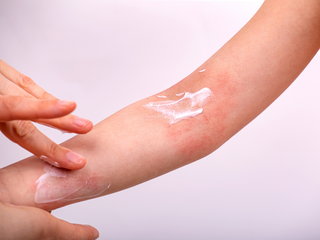You’ve tried steroid creams, oatmeal baths, and the gentlest soaps—yet the eczema just keeps coming back. It’s not just frustrating, it’s exhausting. Some days, it feels like your skin is fighting you.
But what if healing didn’t mean harsh chemicals or temporary band-aids? What if treating atopic eczema was less about “fighting flares” and more about calming your body from the inside out—gently, patiently, and naturally?
In this blog, we’ll answer some of the most common questions we hear—from what really causes eczema, to whether food triggers matter, to whether it’s actually possible to heal eczema for good.

Early eczema symptoms include dryness, redness, itching, and flaky patches.
What Is Atopic Eczema? (Eczema Meaning)
Atopic eczema is a chronic skin condition where the immune system becomes overactive, leading to inflammation, dryness, redness, and itching.
-
Eczema meaning in Hindi: एक्ज़िमा का मतलब है त्वचा की एक समस्या जिसमें खुजली, लालिमा और परतदार त्वचा होती है।
-
It affects all ages but often begins in childhood.
-
Triggers include genetics, stress, environment, and barrier damage.
Can You Treat Atopic Eczema Permanently?
The truth: Atopic eczema cannot be “cured” overnight. It is a chronic condition. But many people experience long-term remission and healthier skin through consistent care.
Natural healing focuses on:
-
Strengthening the skin barrier
-
Reducing inflammation
-
Identifying food triggers for eczema
-
Managing stress and lifestyle factors
So while it may not disappear forever, learning how to treat eczema permanently means reducing flare-ups and regaining control over your skin. Try these 7 Easy Daily Habits to Naturally Manage and Prevent Eczema Flare-Ups
What Causes Atopic Eczema Flare-Ups?
According to Mayo Clinic's 2024 article, triggers vary widely by individual, which is why personalised routines are essential. (source)
Eczema causes are multi-layered:
-
Genetics (family history of allergies or asthma)
-
Environmental stressors like pollution and weather
-
Harsh soaps and synthetic skincare
-
Food triggers for eczema (dairy, gluten, processed sugar, eggs)
-
Stress and lack of sleep
Can Natural Products Really Help?
Most conventional eczema cream in India focuses on symptom suppression, often through steroids. While they can bring short-term relief, they don’t strengthen your skin barrier.
Try natural alternatives like Activated Oils™ infused Ultra Healing Ceam—the therapeutic-grade blends of cold-pressed and essential oils support long-term healing by:
-
Calming inflammation
-
Repairing the lipid barrier
-
Reducing water loss from the skin
-
Improving resilience against flare-ups

Food triggers like dairy, sugar, and gluten often worsen eczema flare-ups.
Does Diet Really Matter in Eczema?
A PubMed 2017 research shows about 20–30% of moderate-to-severe eczema cases are triggered by foods, highlighting the importance of identifying individual triggers. Internal inflammation strongly impacts eczema. A healthy gut often reflects on the skin.
-
Common food triggers for eczema: dairy, gluten, sugar, eggs
-
Supportive foods: turmeric, flaxseeds, walnuts, leafy greens
Common mistake: Cutting everything out blindly. Instead, work with a practitioner on an elimination diet or allergy testing to find your unique triggers.
What Does a Natural Atopic Eczema Routine Look Like?
Healing routines don’t have to be complicated. Here’s a simple framework:
-
Gentle Cleansing
-
Use a balm or oil cleanser with grape seed oil,mango butter, or CICA.
-
Avoid foaming cleansers with sulfates or alcohol.
-
Why this works: Prevents stripping the barrier.
-
Barrier-Repair Moisturising
-
Choose oils rich in fatty acids and ceramide boosters.
-
Oleum Cottage’s Ultra Nourishing Cream is a perfect example.
-
Mistake to avoid: Over-washing and under-moisturising.
-
Targeted Repair with Activated Oils™
-
Anti-inflammatory and regenerative oils to calm flares.
-
Lifestyle Habits
-
Stress management (journaling, meditation, yoga)
-
Adequate sleep for immune regulation
-
Gentle exercise for circulation
-
Consistency
-
Healing isn’t about overnight miracles.
-
It’s about small, steady steps that allow your skin to trust you again.
The Takeaway
Natural approaches to treat atopic eczema work—not as quick fixes, but as long-term healing strategies. By combining barrier-repairing oils, mindful diets, and stress relief, you can shift from constant flare-ups to calmer, more resilient skin.
Healing isn’t about chasing miracle cures. It’s about listening to your skin, supporting its intelligence, and choosing what aligns with your body.
Explore the Oleum Cottage Eczema Care Collection for gentle, steroid-free options trusted by sensitive skin.
If you’re struggling with eczema and want to go deeper into a personalized healing plan, Oleum Cottage skincare experts offer 1-on-1 consults. We’d love to help you find what your skin truly needs.
FAQs About Treating Atopic Eczema
1. Is atopic eczema contagious?
No, atopic eczema is not contagious. It’s an autoimmune condition, not an infection, which means it cannot spread through touch, sharing clothes, or physical contact. Understanding the real eczema meaning helps reduce stigma and misconceptions around the condition.
2. Can I treat atopic eczema naturally?
Yes. While it cannot be cured overnight, you can treat atopic eczema naturally by repairing your skin barrier with oils and gentle creams, and by managing food and stress triggers. With consistency, many people experience long-term relief and healthier skin.
3. What are the most common eczema symptoms?
The main eczema symptoms include persistent dryness, itching, red or inflamed patches, flaking, and sometimes burning or thickened skin. These signs vary in intensity, but early care can stop flare-ups from getting worse.
4. What is the difference between psoriasis and eczema?
Psoriasis usually causes thick plaques with silvery-white scales, while eczema shows up as itchy, red, oozing, or dry patches. Both are autoimmune, but their eczema causes of flare-ups are often linked to allergens and barrier weakness, while psoriasis is more immune-driven.
5. Can diet heal eczema permanently?
Diet alone cannot treat eczema permanently, but identifying food triggers for eczema can drastically reduce flare-ups. Common triggers include dairy, gluten, processed sugar, and fried foods. Adding anti-inflammatory foods like flaxseeds, turmeric, and leafy greens supports long-term healing.
6. Are steroid creams harmful long term?
Yes. Overuse of steroid creams can thin the skin, cause rebound flare-ups, and make your barrier weaker over time. Instead of stopping suddenly, a safer way is to taper their use while introducing soothing alternatives like barrier-repair oils or natural eczema cream in India.
7. What is the best eczema cream in India?
The best eczema cream in India is one that supports barrier repair without steroids, harsh preservatives, or synthetic fragrances. Natural oil-based creams, like Oleum Cottage’s Ultra Healing Cream, can deeply nourish, soothe itching, and reduce flare-ups safely for sensitive skin.
8. Can stress make eczema worse?
Yes. Stress is one of the most common eczema causes of flare-ups. High cortisol levels increase inflammation, which worsens eczema symptoms like redness and itching. Stress management tools such as meditation, breathwork, and journaling are powerful in calming the skin. Here are 5 Easy Ways to Calm Your Skin and Mind
9. How to treat eczema permanently?
There is no one-step cure, but learning how to treat eczema permanently involves combining gentle natural skincare, identifying food triggers, and managing stress. With consistency, many people reduce flare-ups significantly and maintain long-term skin health.
10. Where can I learn more about eczema in Hindi?
For resources on eczema meaning in Hindi, you can visit AIIMS dermatology guides, the Indian Association of Dermatologists, or patient-friendly resources from the Indian Psoriasis and Eczema Foundations. These help you understand eczema care in your own language.

A simple daily routine helps manage eczema permanently—without harsh steroids.
Related Reading:
· A Step-by-Step Guide on How to Heal Eczema Naturally
· Understanding Eczema: Myths, Causes, and Natural Remedies for Long-Term Eczema Relief
· Hand Eczema at Work: 5 Expert-Backed Hacks to Protect and Soothe Your Skin
About the Authors
Vidhi Dave is a certified Aromatherapist with 11 years of experience specialising in the therapeutic use of essential oils and cold-pressed oils for chronic skin and scalp concerns like eczema, dermatitis, and psoriasis. As co-founder of Oleum Cottage, she leads one-on-one aromatherapy consultations, guiding customers on how plant oils can restore balance and resilience to sensitive skin. Known for her deep knowledge of oils and their emotional as well as physical benefits, Vidhi helps people reconnect with nature’s healing intelligence in their daily routines.
Kasturi Sen is a certified practitioner in Cosmetic Science and Formulation with over 10 years of experience in designing evidence-based, natural solutions for chronic skin conditions. As co-founder of Oleum Cottage, she focuses on research-driven product development rooted in dermatological science and modern studies on skin physiology. Kasturi is known for her calm, intuitive presence and her ability to bridge cosmetic science with plant-based formulations, offering personalised, science-backed skincare journeys that empower people to manage their skin confidently.


